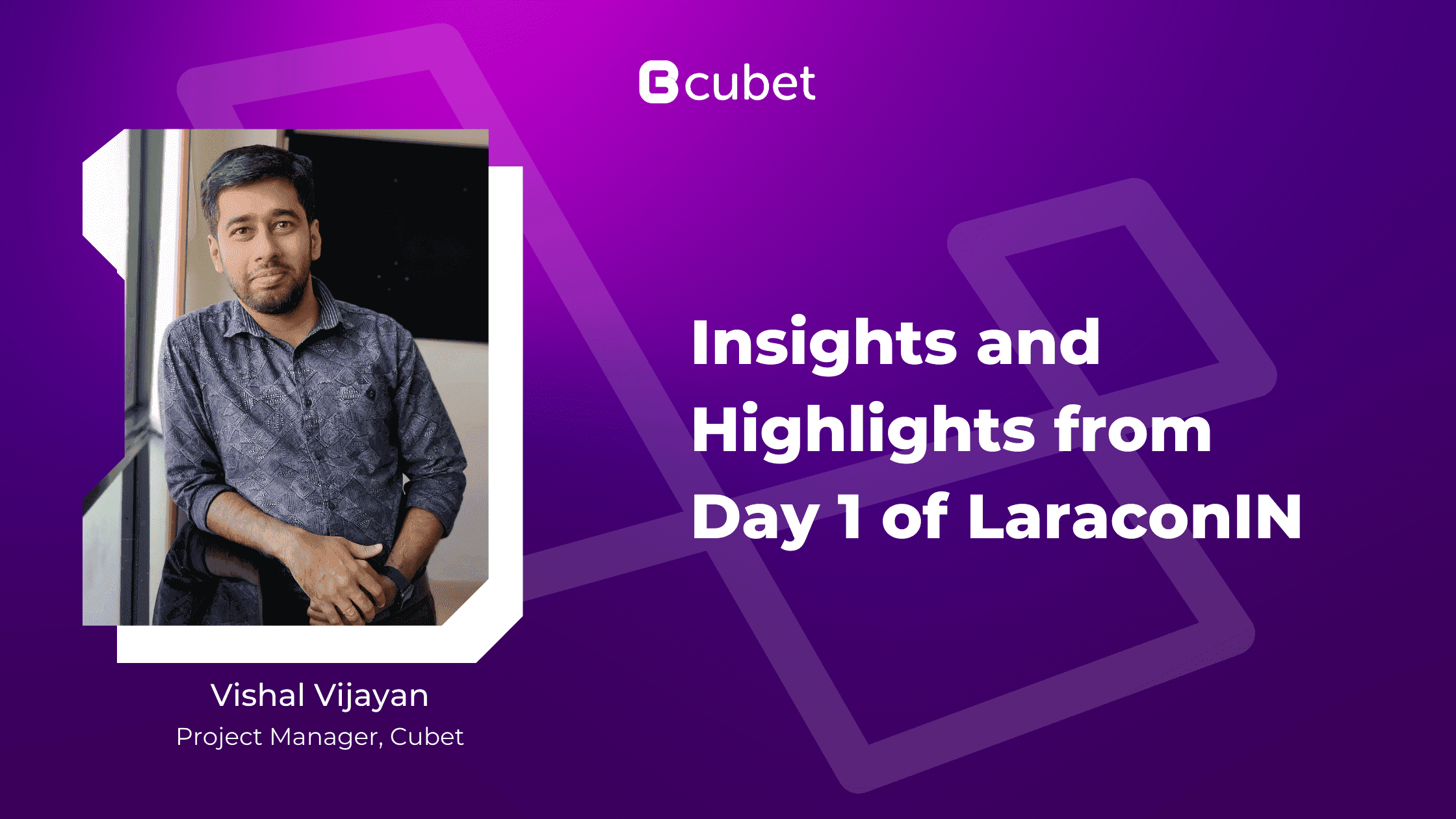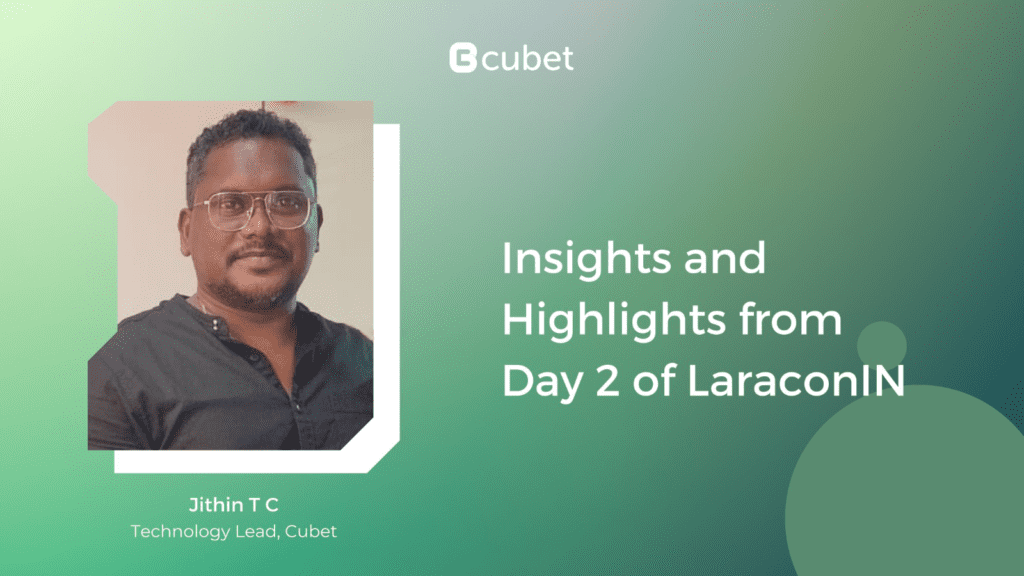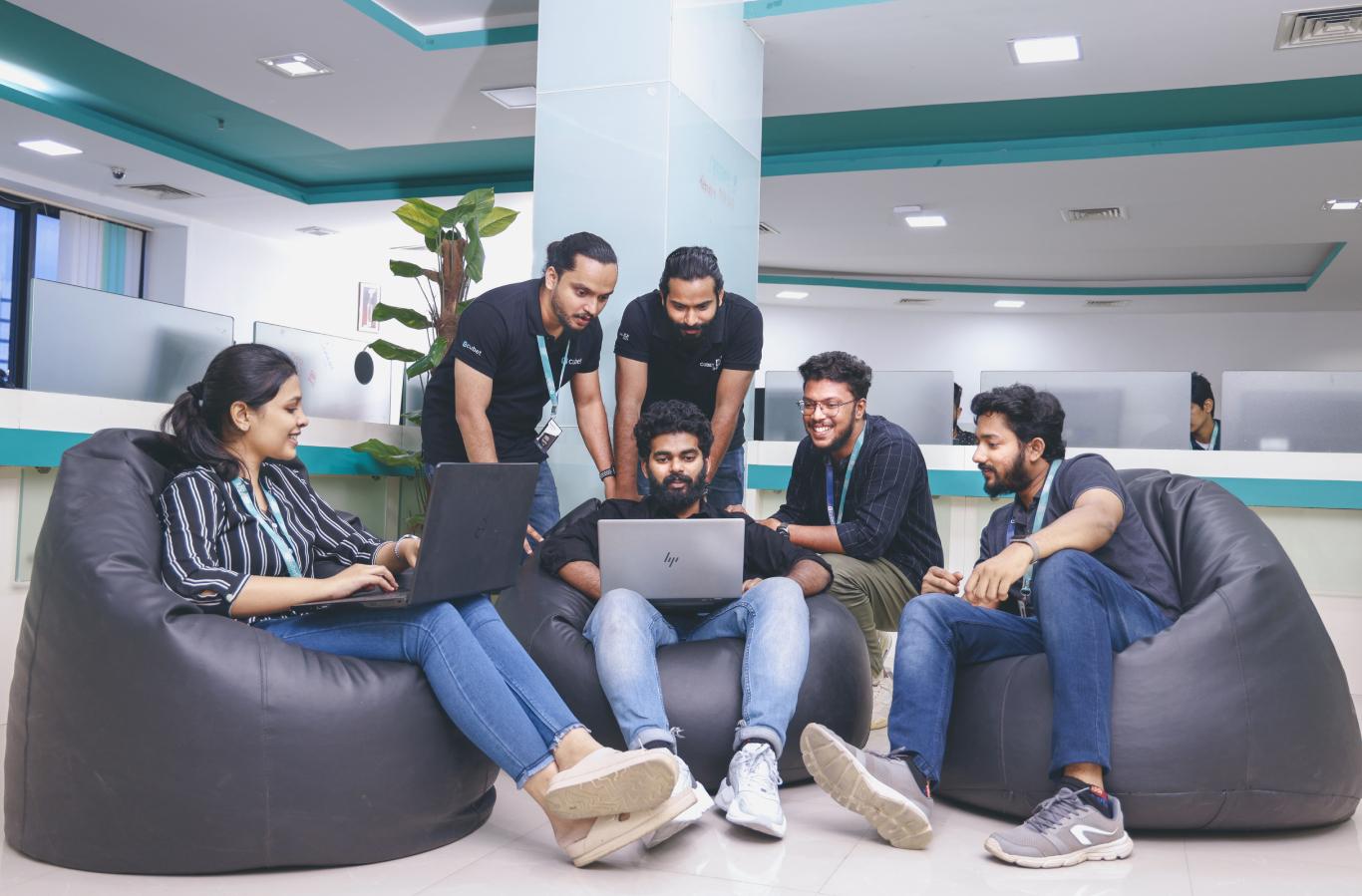Insights and Highlights from Day 1 of Laracon IN - Vishal Vijayan

As a project manager at Cubet and a Laravel enthusiast, I recently had the opportunity to attend the much-awaited Laracon IN conference held in the vibrant city of Ahmedabad, India. It was an amazing experience to be a part of such a huge gathering of tech enthusiasts, all passionate about Laravel and its latest developments. The two-day conference was jam-packed with informative and engaging sessions delivered by some of the industry’s finest experts.
I must say, it was a fantastic opportunity to learn from the best in the industry, and be inspired by their experiences and insights. In this blog, I’m trying to transcribe my experience from the different sessions that I attended on Day 1 of Laracon IN, provide updates about the key takeaways from the tech talks, and share my thoughts about the sessions and what it means for developers. I hope this will be helpful for my fellow Laravel enthusiasts and everybody following the developments in Laravel and Laracon
And before I forget, a shout out to my colleague, Nandul Das, who has been a part of this journey and has written down his experience of the trip and Laracon IN.
Let’s begin with the Laracon Talks
Fantastic functions of PHP and where to find them?
By Freek Van Der Herten
We had Freek Van Der Herter, a developer and partner at Spatie. In his opinion, we need to be more influenced by other ecosystems, and he said that Termiwind, Pest, Livewire, and even Laravel are influenced by other ecosystems. Freek’s talk was all about exploring some hidden PHP functionalities and Laravel packages, and I believe the stuff he shared would assist many developers!
One of the highlights of the session was the ‘invade’ package, which offers a function to read/write private properties and call private methods of an object. It may not seem like a useful feature in most scenarios; however, it could come in handy if we’re forced to access private properties or methods outside their scope.
Another interesting package Freek talked about was ‘Ray’, which is a desktop app designed for Laravel desktop debugging. It provides a cool UI, more readability than the traditional dump() method, and even allows for measuring performance. However, it requires installation on the desktop and a license to use its features, so it may not be worth it for everyone.
Freek also mentioned the ReflectionClass class, which is useful in rare scenarios where we need to get information about a class. Additionally, he shared the pcntl_fork() function, which allows for multi-threading in PHP, and the ReactPHP library, which is inspired by event-driven programming in Node.js and other languages. Finally, he introduced the AMPHP library, which is designed for building fast, concurrent applications with PHP.
Overall, Freek’s session was an enriching experience. Learning about these hidden PHP functionalities and Laravel packages has broadened my understanding of what is possible and sparked new ideas for future projects. While some of the features might not be useful in our everyday coding practises, they are definitely worth exploring for specific requirements.
Give your Laravel some AI
By: Marcel Pociot
Marcel Pociot is a prominent Laravel developer, who works at Beyondcode as CTO. Marcel Pociot’s talk at Laracon left me feeling incredibly inspired and eager to explore the potential of AI in Laravel development. As a Laravel developer, I am always looking for ways to improve the coding process and enhance the user experience. Marcel’s session was about integrating Generative AI with Laravel applications and was really interesting.
Platforms like Avatarai.me, which allows users to create avatars from their images, and Dall-E-2 and Stable Diffusion Web, which create images based on descriptions, demonstrate the potential for AI to revolutionize the way we design and develop web applications. Additionally, the OpenAI Codex and Github Copilot code autocompletion and generation tools are incredibly promising for coders.
Marcel’s also highlighted the ways in which AI can be used for image and video analysis, detecting objects and faces, and analyzing emotions, which I believe could lead to a more personalized user experience. And tools like ChatGPT and Tabnine, which use statistical prediction machines to suggest coding fixes, could save us significant time and effort.
One particularly useful example he presented involved sending error messages to ChatGPT to collect details and suggest solutions, which could then be used to update error screens. As a developer, I know how frustrating debugging can be, and the idea of AI assistance is incredibly appealing.
Overall, Marcel Pociot’s talk at Laracon was truly enlightening and opened up a world of possibilities for me as a Laravel developer. I am excited to explore the potential of AI in Laravel development and see what innovative web applications I can create with these new tools and libraries.
Documenting Laravel APIs
By: Jame Brooks
James Brooks is a web developer and part of the Laravel core team and he sounded like he has a wealth of experience in developing web applications using Laravel and other web technologies.
In his talk, “Documenting Laravel APIs,” James Brooks stressed the importance of accurate and up-to-date documentation to facilitate communication and collaboration among developers. He introduced some of the latest tools and libraries available for documenting Laravel APIs, including Checkmango and Scribe.
Checkmango can make full-stack A/B Testing simple and it can optimize the engagements and conversion rates with its straightforward A/B testing platform. Scribe, on the other hand, generates API documentation and includes a professional-looking documentation template. James also presented a simple three-step process, Code -> Scribe -> Document, which can be used to document Laravel APIs effectively.
I think that James’ talk was a valuable resource for Laravel developers looking to improve their API documentation practices and deliver a better user experience. Scribe, in particular, looks like an attractive and developer-friendly API documentation generator for Laravel applications. I think we could definitely start using it in our Laravel and Node.js projects for API documentation.
The Hitchhiker’s Guide to the Laravel Community
By: Caneco
Caneco is a well-known figure in the Laravel community, with many years of experience in Full stack development and UI/UX. Caneco provided valuable insights into the latest tools and resources available in the Laravel community.
Caneco discussed various channels and platforms for Laravel developers to keep up-to-date with the latest news and trends in Laravel development. He highlighted Laravel Daily, a blog that covers a wide range of topics related to Laravel, and the Laravel Podcast and Laravel India Podcast, which feature interviews with Laravel developers and cover topics related to Laravel development.
Caneco also discussed Laracast, a platform that provides high-quality video tutorials for Laravel developers, and Laravel Discord, a community of Laravel developers who chat, collaborate, and help each other with their Laravel projects. He also talked about the Casual Artisan Call developed by Freek and Rumpel a service that connects Laravel developers with clients who need Laravel development services.
Caneco highlighted several packages and tools for Laravel, including Spaties, which provides various packages for Laravel, including image manipulation and PDF generation, and BeyondCode, a company that provides various tools and resources for Laravel developers, including the Laravel Telescope debugging tool.
I feel that the resources mentioned by Caneco in the talk are excellent sources for Laravel developers who are beginners and looking to stay up-to-date with the latest developments in the Laravel community, but most of the details and information must be already familiar to and followed by senior developers. His presentation style was entertaining and engaging, making this one of the most enjoyable sessions from Day 1 at Laracon IN.
Servers? Where we are going. We don’t need servers?
By: Joe Dixon
Joe Dixon is a software developer focusing strongly on Laravel and serverless architecture. During Joe Dixon’s talk at Laracon, I was truly inspired by his passion for building scalable, efficient, and reliable applications using modern web technologies. As a software developer myself, I found his insights on serverless architecture and its integration with Laravel to be incredibly valuable.
He presented the benefits and challenges of using serverless architecture in Laravel applications. Also, he showed us how Laravel provides an excellent framework for building RESTful APIs and handling HTTP requests while integrating queues to offload heavy workloads and freeing up server resources for other tasks.
What really stood out to me was Joe’s discussion of AWS S3 and RDS, which provide excellent management of filesystem and database services, respectively. Additionally, his insights into Lambda, a code execution platform without needing a server, and Event Bridge, a tool to simplify complex architectures, were incredibly insightful.
I was also impressed by Joe’s discussion of Laravel Vapor, a serverless deployment platform for Laravel powered by AWS. It provides a one-stop solution for applications needing auto-scaling and simplifies the server management and deployment process, including tools for load testing and scaling.
Overall, Joe’s talk at Laracon provided valuable insights and practical advice for developers looking to leverage serverless technologies in their Laravel applications. You will be able to manage your Laravel infrastructure on Vapor and fall in love with the scalability and simplicity of serverless.
Wrap Up
For me, Day 1 of Laracon IN was all about unlearning and learning. The quality of the sessions, as well as the participation of the attendees, made it an overall interesting experience.
Looking ahead, it is clear that Laravel will remain a major player in the world of web development, thanks to the efforts of the Laravel core team and community. I’m at a loss for words to describe the charisma and energy of the Laravel community, which is what makes Laravel so unique.
That concludes Day 1. Check out the insights & highlights of Day 2 of Laracon IN.

I’d like to hear your thoughts on the updates and opinions I’ve presented here, and I hope this helped you get a sense of the Laracon IN Day 1 experience.
